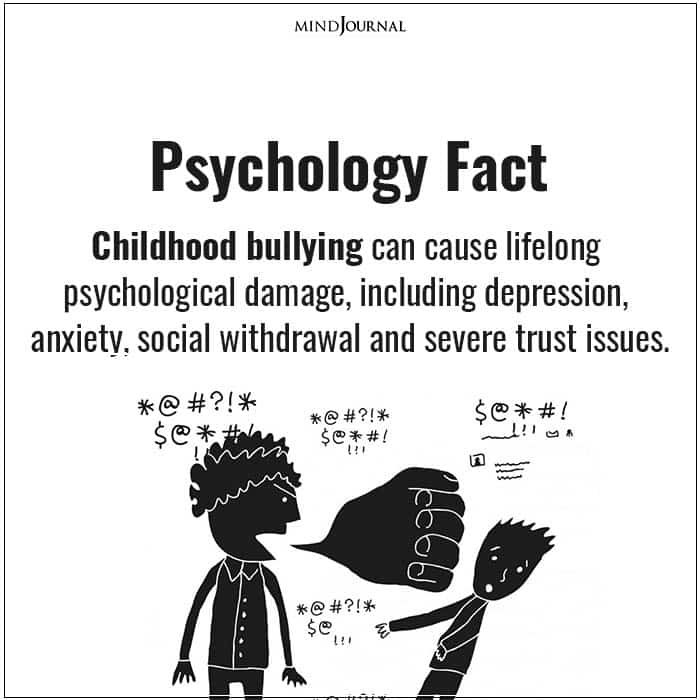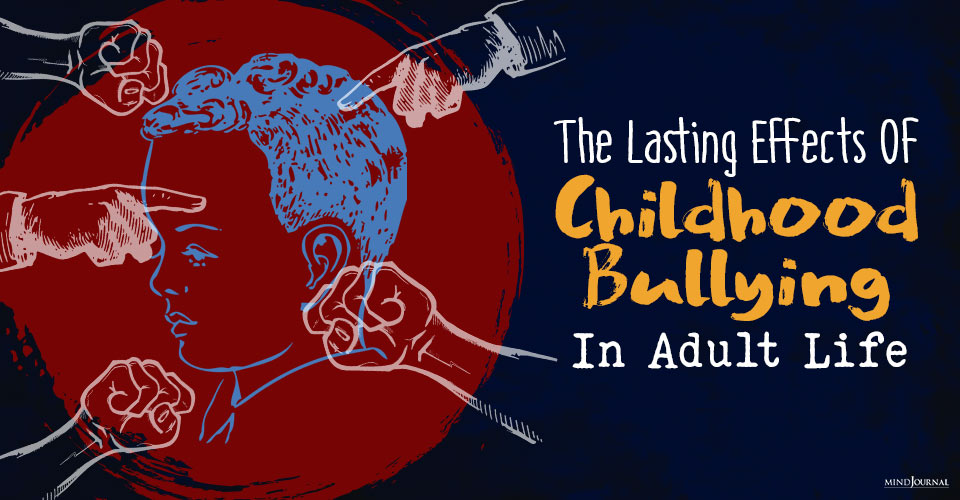Bullying is extremely detrimental to the mental health of any person, especially when one is bullied as a child. The trauma caused by childhood bullying is hard to heal even when your enter adulthood.
A lot of research has been carried out on this issue. According to findings, a person who has been a victim of childhood bullying is prone to suffer from psychological disorders as an adult compared to a child who has not faced any bullying.
On the 9th of December, JAMA Psychiatry published an online article that explained that children who have been bullied develop mental disorders like depression when they become adults.
Dr. Andre Sourander, who is a faculty of child psychiatry at the University of Turku in Finland stated that a person who experienced childhood bullying undergoes chronic depression which needs treatment. Also, this depressive disorder becomes prominent when the child grows up.
In order to track the dynamics of the disorders caused by bullying, Sourander carried out an experiment where around 5000 children were taken into consideration.
The process of analysis was observing children of 8 years of age and then tracking them up to the age of 29 years. This was done to analyze the long-term effect of bullying.
The children who were 8 years of age were asked to answer certain questions. These questions included points like whether they have been bullied or have they bullied other children and how frequently these acts have occurred.
Related: Sibling Bullying and Abuse: Signs and Effects
Along with the children, the guardians and caregivers were also taken into consideration. They too were asked questions regarding the bullying of children.
From the findings and analysis of this data, the researchers classified children into four groups.
1. The first one was the ones who were neither bullied by others nor bullied themselves.
2. The second category of children were those who bullied others but didn’t get bullied by others.
3. The third one consisted of children who were bullied by others but didn’t bully others themselves.
4. The last category had children who were bullied by others and bullied others too.
Apart from the first category, the rest three face a wide range of mental disorders when they grow up. Most cases of childhood bullying are not reported and most countries do not have any specific laws for childhood bullying. Hence, bullying becomes a difficult thing to prevent.
Studies have shown that children who have not bullied themselves or were not bullied by others did have mental disorders but these had no connection with bullying. The others, however, face psychological disorders which are predominantly related to bullying.
So now the question is, how childhood bullying affects adults? Here is the list of the primary disorders a child faces as an adult because of their history of childhood bullying.

How Childhood Bullying Damages Adult Life
(1) Bipolar Disorder
Children who have been bullied, or who bullied others, but managed to get away with it is prone to Bipolar Disorder as a grown-up. When the child was angry and emotionally upset due to bullying, nobody taught them to control their anger. So, when the child grows up into an adult, they do not have any training in anger management.
The world around us is very complicated. The child who bullied others might be powerful among their peers but as an adult, that might not be possible always.
There will be a number of times when the adult will be dominated by others and will fail to overpower them. This will lead to anxiety and depression and hence might lead to Bipolar Disorder.
Related: 10 Mental Health Tattoos That’ll Empower You To Overcome Your Struggles
(2) Depression
Depression is one of the serious mental health issues which is caused due to childhood bullying. A child who has been bullied and couldn’t fight back is also a child who has been very weak and vulnerable. Mostly, a child like this is prone to keep the attack to themselves and tends to get depressed very easily.
Their depression gets worse as they grow up and the pain inside them increases. The child suffers from fear and tries to avoid communication with others as an adult. The level of this depends on the extent of the attack.
If this child grows into an adult who is weak and vulnerable, they tend to face more problems, they tend to get attacked more, and eventually, they hurt themselves more. Since it has been their habit to keep this to themselves, they will eventually succumb to depression.
Related: 12 Ways to Empower Your Child Against Bullying
(3) Substance abuse
Children who have been bullied or children who bullied others or children who have done both are prone to getting involved with substance abuse as adults. All these unhealthy behaviors were not treated when they were children and they are bound to go astray as adults.
Depression, anxiety disorders, and other psychological issues will provoke them to take resort to substance abuse which is again a psychological disorder.
It is important to take care of the mental health of our children. It is necessary for parents or guardians and teachers to keep an eye on bullying among children because they have long-lasting effects on their psychological and social behavior which hampers their future development.
Want to know more about childhood bullying effects on adulthood? Check this video out below!
Frequently Asked Questions (FAQs)
Why am I always the victim of bullying?
Bullies tend to pick on those people who appear weaker and quiet to them. This happens because they believe that those people will not fight back.
How will you know when bullying is solved?
Talking about what bullying is and how to stand up against is important. Tell kids that bullying is unacceptable and make sure children know when and how to get help. Standing up for people if they’re being bullied is how you can solve the issue.
What is considered bullying by a teacher?
If a teacher uses his or her own power to punish, manipulate, or despise a student beyond proper disciplinary action, it is considered bullying or harassment.
How to retaliate against a bully?
It’s important to remember that fighting back is not advisable. You may not know how to fight, or you may just not want to endanger yourself. If you are being bullied, talk to your parents or a trusted adult (teacher, school counselor, principal, etc.)
What is the difference between being a bully and being a bully victim?
The bully and the victim may share personality traits as they’re both perpetrators and victims of negative acts. Bully-victims are children who have not only been targeted by bullies but have also bullied other kids.













Leave a Reply